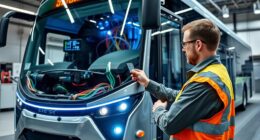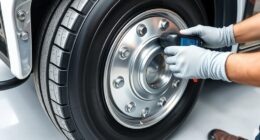As an electric bus driver, your day starts with safety checks on tires, brakes, and lights, guaranteeing everything meets standards. You manage your route efficiently using advanced software and stay alert to road conditions. Throughout your shift, you monitor battery levels, optimize driving for smoothness, and communicate with dispatch for updates. Before ending your day, you perform final inspections and guarantee your vehicle is fully charged. Keep going to discover more about what makes this role both challenging and rewarding.
Key Takeaways
- Conduct safety checks, review routes, and communicate with dispatch before starting the shift.
- Operate the electric bus smoothly, monitor battery life, and utilize regenerative braking for efficiency.
- Navigate routes safely using advanced software, adapting to traffic and passenger needs promptly.
- Maintain vehicle cleanliness, perform interim inspections, and follow electric-specific safety protocols.
- End the shift with full charging, report issues, and ensure the bus is prepared for the next day.

A day in the life of an electric bus driver begins with thorough preparation to guarantee the vehicle is ready for the route ahead. You start by checking that the bus is fully charged, ensuring there’s enough power for the entire shift. Safety checks follow, where you verify all systems are functioning properly—tires are inflated, brakes respond well, and lights are operational. Reviewing your route helps you familiarize yourself with the day’s schedule and identify potential obstacles. You also communicate with dispatch to confirm route details and any last-minute changes. Personal preparation is next; you dress appropriately to stay comfortable and safe throughout the day.
Early morning operations involve starting the bus and confirming all systems are operational. You perform pre-trip inspections, paying close attention to tires, brakes, and lights, making sure everything meets safety standards. Compliance with local electric vehicle regulations is essential, so you ensure the vehicle adheres to all rules. Understanding the vehicle’s technology, like regenerative braking, helps you optimize performance and efficiency. Knowing how the electric systems work allows you to manage battery life better and prepare for charging needs during the day.
Starting the bus and conducting pre-trip safety inspections ensure all systems function properly and meet safety standards.
As you begin driving, you notice the benefits of electric buses—quieter rides and reduced emissions make for a more comfortable experience for passengers. The bus accelerates smoothly and responds quickly, giving you confidence behind the wheel. Managing battery efficiency becomes important, especially in stop-and-go traffic, so you monitor power levels carefully. Understanding your charging schedule is crucial to avoid running low on battery during your shift. Proper maintenance of the vehicle helps extend the lifespan of the electric bus and ensures reliable operation. Additionally, staying informed about advancements in electric vehicle technology can help you operate the bus more effectively.
The quiet operation of electric buses creates a peaceful environment, which both you and passengers appreciate. Throughout your route, advanced routing software helps optimize your path for safety and efficiency. Flexibility is key; you adapt to changes in passenger numbers or road conditions and stay in close contact with dispatch and fellow drivers. A solid understanding of local terrain and road hazards helps you navigate safely, maintaining smooth operations. You remain attentive to your surroundings, ensuring safe and timely stops while managing the vehicle’s performance.
Midday, you take a well-deserved break to rest and recharge. During this time, you might also handle other responsibilities, such as transporting students for field trips or attending to minor maintenance tasks like charging the bus or checking fluid levels. Keeping the interior clean and organized is part of your routine to maintain a safe and healthy environment. Sometimes, you assist with other transportation needs, making your day varied and engaging.
Safety remains a priority throughout your shift. You stay updated on emergency procedures specific to electric buses, including battery management and electric-specific emergency responses. Regular safety checks help prevent issues and keep you prepared for any situation. Being aware of the environmental benefits of electric buses encourages you to follow eco-friendly practices and promote sustainability during your work.
At the end of your shift, you ensure the bus is fully charged for the next driver, perform final inspections, and report any concerns or incidents. You update your route knowledge and leave the vehicle clean and secure, ready for another productive day.
Frequently Asked Questions
How Do Electric Bus Drivers Handle Charging Schedules?
You may not set the charging schedules yourself, but your awareness and communication are essential. You monitor battery levels using onboard systems and follow the charging plans set by management.
When needed, you’re adaptable to schedule changes, ensuring buses are charged during off-peak hours or as required. Clear communication with charging teams helps optimize operations, reduce downtime, and extend battery life, ultimately keeping your routes running smoothly.
What Safety Protocols Are Specific to Electric Buses?
You follow specific safety protocols to protect yourself, your vehicle, and others. You identify high-voltage systems with bright orange cabling, activate automated disconnects during crashes, and wear PPE like insulated gloves.
You perform insulation resistance checks before charging, enforce Lockout-Tagout procedures during maintenance, and stay vigilant for thermal events.
You also coordinate with first responders, share emergency guides, and use specialized equipment to handle lithium-ion fires safely and effectively.
How Does Driving an Electric Bus Differ From a Diesel Bus?
Driving an electric bus differs from a diesel bus mainly in how it feels and operates. You’ll notice less noise and vibration, making your ride smoother.
The electric bus delivers quick power at low speeds, so acceleration feels different.
You’ll also need to adapt to charging schedules and handle the technology systems.
What Maintenance Challenges Are Unique to Electric Buses?
Think of electric buses as complex symphonies where each instrument demands precision. Your main challenge is managing the battery’s delicate health, like tending a fragile garden, monitoring charge and discharge.
Electronic systems are intricate labyrinths needing specialized tools and knowledge. You must keep spare parts handy and stay ahead of technical issues, ensuring the harmony of smooth, efficient operation despite the unique quirks of electric technology.
How Do Drivers Manage Passenger Comfort With Electric Bus Noise?
You manage passenger comfort with electric bus noise by staying aware of the vehicle’s quieter operation. You communicate calmly, knowing there’s less engine noise to mask your words.
You can adapt driving habits to minimize high-frequency sounds and use smooth acceleration and braking to reduce vibrations.
Additionally, you guarantee the bus is well-maintained with proper insulation, making the ride more peaceful and comfortable for everyone onboard.
Conclusion
By the end of your shift, it’s funny how a simple day behind the wheel reveals more than just driving skills. You notice the quiet hum of the electric engine, a coincidence that reminds you of how technology quietly transforms everyday life. As you park the bus, you realize that this peaceful, eco-friendly routine isn’t just a job — it’s part of a larger, unexpected shift toward a greener future you’re helping shape.








